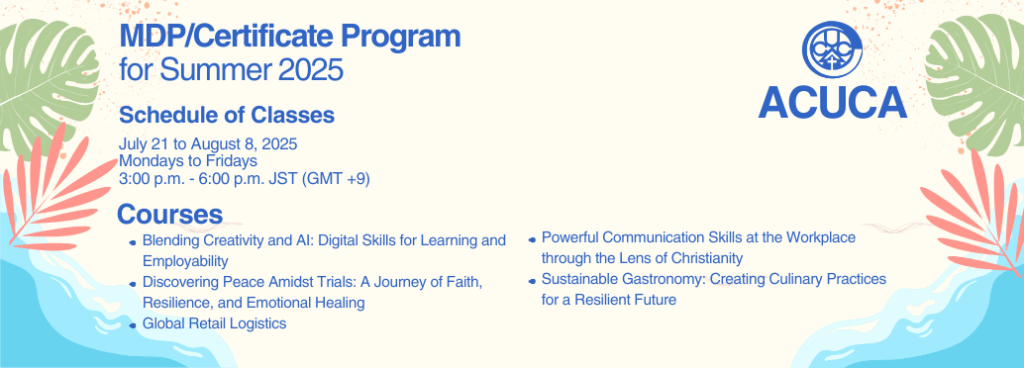
- About
- Blending Creativity and AI: Digital Skills for Learning and Employability
- Discovering Peace Amidst Trials: A Journey of Faith, Resilience, and Emotional Healing
- Global Retail Logistics
- Powerful Communication Skills at the Workplace through the Lens of Christianity
- Sustainable Gastronomy: Creating Culinary Practices for a Resilient Future
The radical transformation from a traditional face-to-face classroom setting to an exclusive online learning environment substantially affected the educational systems of many countries during the pandemic by Covid-19. The inherent challenges necessitate the implementation of efficient and effective methods of delivering online distance learning to preserve classroom equilibrium, resulting in the acceptance of this form of instruction as a proven and effective alternative.
The ACUCA Micro Degree Program (MDP) was created in the summer of 2022 with unanimous approval from the Executive Committee (EXCO) to fulfill the three main objectives outlined in the existing ACUCA Constitution and By-Laws at that time of the program’s inception and implementation: to develop and maintain Christian character; to enrich the quality of their educational programs and those of the other institutions of learning; and to re-examine the relevance of their objectives and programs concerning the needs of a changing society. Two additional objectives were incorporated into the program’s rationale: to offer students from member institutions supplementary education that is not available at their home colleges or universities, and to provide credentials to enhance employability. The MDP was also created to provide a platform for the faculty members to collaborate on creating specific micro degrees to be offered in the program.
At the end of the program, the students were awarded with Micro Degree Certificate of a particular field of concentration within the specified period and have been able to complete all the requisite courses, normally two. Otherwise, a completion certificate if only one course has been complied with.
Blending Creativity and AI: Digital Skills for Learning and Employability
Assoc. Prof. Vanitha N
(Women’s Christian College)
This course students to explore and evaluate digital tools and platforms that enhance self-directed learning and professional development. Through hands-on experience, students will master skills in image editing, video production, animation, and AI-powered content creation. The course emphasizes the integration of emerging technologies such as AI, AR/VR, and interactive quizzes to enhance learning and career opportunities. Students will apply these skills in a capstone project, showcasing their ability to create professional-quality content. The course is designed to provide students with the knowledge and hands-on experience necessary to effectively utilize digital tools for personal development, career advancement, and entrepreneurial ventures.
Blending Creativity and AI Digital Skills for Learning and Employability.pdf
Discovering Peace Amidst Trials: A Journey of Faith, Resilience, and Emotional Healing
Asst. Prof. Marietta T. Casanova
(Assumption College)
This 15-day course invites participants into a deeply personal and spiritual exploration of inner peace amid life’s adversities, inspired by the book Discovering Peace Amidst Trials. Combining reflective writing, scripture meditation, guided storytelling, and personal sharing, this course helps learners develop emotional resilience, spiritual maturity, and trust in divine providence. Participants will be guided through life themes such as waiting, letting go, financial challenges, vocational discernment, and healing, all anchored on Christian faith and personal experience.
Discovering Peace Amidst Trials A Journey of Faith, Resilience, and Emotional Healing.pdf
Global Retail Logistics
Asst. Prof. Charlet Christina Rajakumari R
(Madras Christian College)
Course Objectives:
・To understand the logistics processes in the context of international retail operations.
・To explore the complexities of cross-border retail supply chains.
・To study global logistics strategies, technologies and sustainable practices.
Powerful Communication Skills at the Workplace through the Lens of Christianity
Dr. Riana Magdalena
(Atma Jaya Catholic University)
This course explores communication skills in the workplace through the lens of Christian values and principles. Rooted in the teachings of Jesus Christ, Christian communication emphasizes truth, humility, empathy, patience, and love. Colossians 4:6 instructs, “Let your conversation be always full of grace, seasoned with salt, so that you may know how to answer everyone.”
Powerful Communication Skills at the Workplace through the Lens of Christianity.pdf
Sustainable Gastronomy: Creating Culinary Practices for a Resilient Future
Assoc. Prof. Mark Daevid M. Adem, PhD
(Trinity University of Asia)
Sustainable Gastronomy: Creating Culinary Practices for a Resilient Future course provides an in-depth exploration about gastronomy such as the intersection of food, culture, and sustainability. Students will examine the environmental, social, and economic dimensions of gastronomy and how the culinary industry can support sustainable development goals. Through lectures, discussions, case studies, and practical applications, the learners will gain the knowledge and skills to design sustainable menus, reduce food waste, source ethically, and advocate for food systems that are resilient and equitable.
Sustainable Gastronomy Creating Culinary Practices for a Resilient Future.pdf
